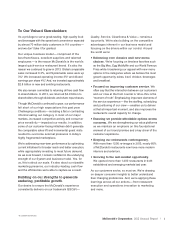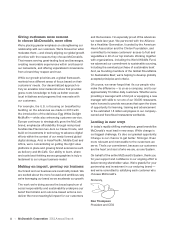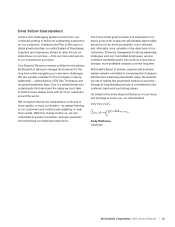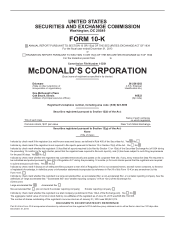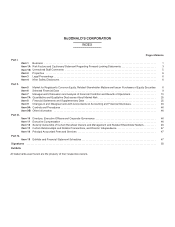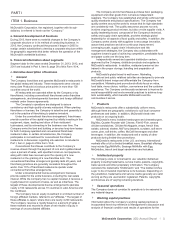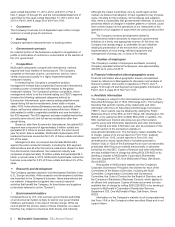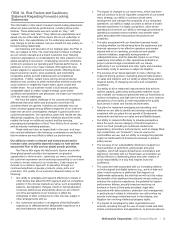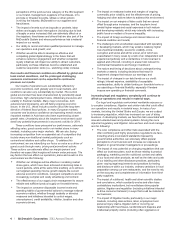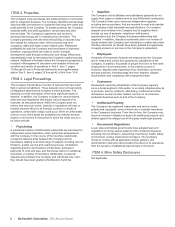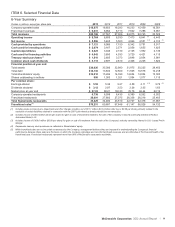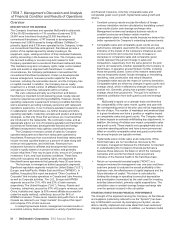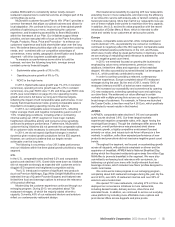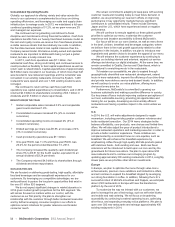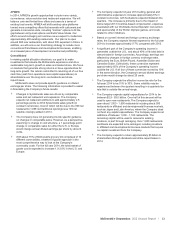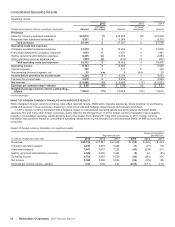McDonalds 2013 Annual Report Download - page 13
Download and view the complete annual report
Please find page 13 of the 2013 McDonalds annual report below. You can navigate through the pages in the report by either clicking on the pages listed below, or by using the keyword search tool below to find specific information within the annual report.
McDonald’s Corporation 2013 Annual Report | 5
opportunistic attempts to enforce patents used in information
technology systems); the relative level of our defense costs,
which vary from period to period depending on the number,
nature and procedural status of pending proceedings; the
cost and other effects of settlements or judgments, which
may require us to make disclosures or take other actions that
may affect perceptions of our brand and products; and the
scope and terms of insurance or indemnification protections
that we may have;
Adverse results of pending or future litigation, including
litigation challenging the composition and preparation of our
products, or the appropriateness or accuracy of our
marketing or other communication practices;
The risks and costs to us, our franchisees and our supply
chain of the effects of climate change, greenhouse gases,
energy and water resources, as well as the increased public
focus, including by governmental and non-governmental
organizations, on these and other environmental
sustainability matters (e.g., packaging and waste, animal
health and welfare and land use) and the increased pressure
to make commitments or set targets and take actions to meet
them, which could expose the Company to market,
operational and execution costs or risks, particularly when
actions are undertaken Systemwide;
The increasing focus on workplace practices and conditions
and costs and other effects of compliance with U.S. and
overseas regulations affecting our workforce and labor
practices, including those relating to wage and hour
practices, healthcare, immigration, retirement and other
employee benefits and unlawful workplace discrimination,
and our exposure to reputational and other harm as a result
of perceptions about our workplace practices or conditions or
those of our franchisees;
Disruptions in our operations or price volatility in a market
that can result from governmental actions, such as price,
foreign exchange or import-export controls, increased tariffs
or government-mandated closure of our or our suppliers'
operations, and the cost and disruption of responding to
governmental investigations or proceedings, whether or not
they have merit;
The legal and compliance risks and costs associated with
privacy, data protection and similar laws, particularly as they
apply to children, the potential costs (including the loss of
consumer confidence) arising from alleged security breaches
of information systems, and the risk of resulting criminal
penalties or civil liability related to such breaches;
The impact on our operations of tax and other regulations
affecting capital flows, financial markets or financial
institutions, which can limit our ability to manage and deploy
our liquidity or increase our funding costs; and
The impact of changes in financial reporting requirements,
accounting principles or practices, including with respect to
our critical accounting estimates, changes in tax accounting
or tax laws (or related authoritative interpretations),
particularly if corporate tax reform becomes a key component
of budgetary initiatives in the United States and elsewhere,
and the impact of settlements of pending or any future
adjustments proposed by the IRS or other taxing authorities
in connection with our tax audits, all of which will depend on
their timing, nature and scope.
Trading volatility and price of our common stock may be
affected by many factors.
Many factors affect the volatility and price of our common
stock in addition to our operating results and prospects. The most
important of these, some of which are outside our control, are the
following:
The continuing unpredictable global economic and market
conditions;
Governmental action or inaction in light of key indicators of
economic activity or events that can significantly influence
financial markets, particularly in the United States which is
the principal trading market for our common stock, and
media reports and commentary about economic or other
matters, even when the matter in question does not directly
relate to our business;
Changes in financial or tax reporting and accounting
principles or practices that materially affect our reported
financial condition and results and investor perceptions of our
performance;
Trading activity in our common stock or trading activity in
derivative instruments with respect to our common stock or
debt securities, which can be affected by market commentary
(including commentary that may be unreliable or incomplete);
unauthorized disclosures about our performance, plans or
expectations about our business; our actual performance and
creditworthiness; investor confidence generally; actions by
shareholders and others seeking to influence our business
strategies; portfolio transactions in our stock by significant
shareholders; or trading activity that results from the ordinary
course rebalancing of stock indices in which McDonald's may
be included, such as the S&P 500 Index and the Dow Jones
Industrial Average;
The impact of our stock repurchase program or dividend rate;
and
The impact on our results of other corporate actions, such as
those we may take from time to time as part of our
continuous review of our corporate structure in light of
business, legal and tax considerations.
Our results and prospects can be adversely affected by
events such as severe weather conditions, natural disasters,
hostilities and social unrest, among others.
Severe weather conditions, natural disasters, hostilities and
social unrest, terrorist activities, health epidemics or pandemics
(or expectations about them) can adversely affect consumer
spending and confidence levels or other factors that affect our
results and prospects, such as commodity costs. Our receipt of
proceeds under any insurance we maintain with respect to certain
of these risks may be delayed or the proceeds may be insufficient
to offset our losses fully.
ITEM 1B. Unresolved Staff Comments
None.


